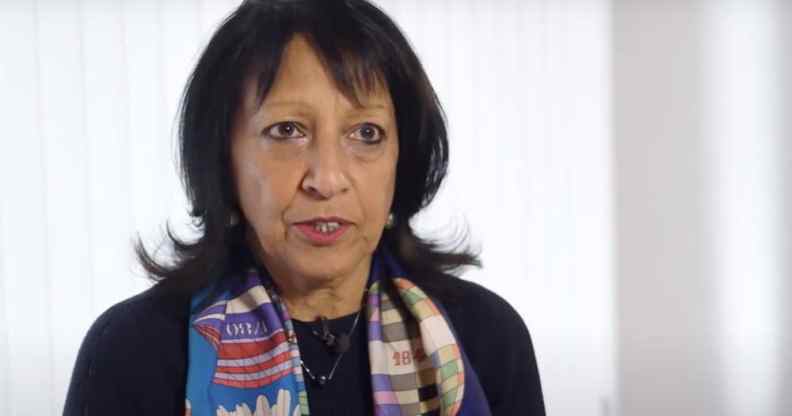Cis women have the right to be ‘gender critical’ without being ‘abused’, says UK’s new equality chief

Baroness Falkner spoke in support of “gender critical” views (YouTube/UBS Centre)
The new head of Britain’s equalities watchdog believes cis women should have the right to express “gender critical” views without being “abused”.
Baroness Falkner of Margravine, chairwoman of the Equalities and Human Rights Commission, suggested it is “entirely reasonable” to question trans people’s gender identity, a protected characteristic under the Equality Act 2010.
In her first interview since taking office, Falkner said the commission was determined to protect the “freedom of belief”.
“Someone can believe that people who self identify as a different sex are not the different sex that they self identify,” she told The Times. “A lot of people would find this an entirely reasonable belief.”
Falkner was appointed to the commission, which has statutory responsibility to police the UK’s equalities laws, in December 2020.
A few months later the commission controversially intervened in the case of Maya Forstater, a woman who tried and failed to convince an employment tribunal that her refusal to accept that trans women are women should be a protected “philosophical belief”.
The judge said that her anti-trans views were “not worthy of respect in a democratic society” and that they conflict with the fundamental human rights of others.
Yet the equality commission has backed Forstater’s appeal, arguing that the judge incorrectly interpreted the law that should have protected her right to freedom of belief and speech.
“The principles are absolutely clear, which is why we took a position to intervene in the case,” Falkner said. “The principles are that freedom of belief is protected.
“So there wasn’t any doubt in my mind whatsoever, that this was something that we should do.”
The Baroness was particularly concerned that “abuse and stigmatisation” prevents certain people from expressing anti-trans views, yet appeared to make no mention of the routine harassment faced by the transgender community.
“There is too much self censorship going on – certainly in terms of gender critical theory,” she said. “And what happens to women who raise that does seem to be an effect on them of abuse and stigmatisation.
“We ought to be able to have a debate about it, even when we disagree with them, without them feeling so isolated.”
Falkner also defended the government’s “reprehensible” race report, which denied the existence of systemic racism in the UK. The report has been condemned by the UN for normalising white supremacy and “repackaging racist tropes”.
“I’d urge people to get beyond the narrative and look at the proposals, because these [the report’s authors] are good people who put themselves forward to do a serious job, and the way that they have been attacked for doing a serious job is unconscionable,” she said.
“Nobody should be attacking anyone else in those terms however profound your disagreement might be.”

